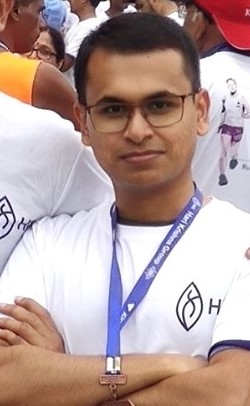By Gaurav Chaubey

~ Lewis Carroll, in ‘Alice’s Adventures in Wonderland’
“Lawyers are the only persons in whom ignorance of the law is not punished”, quipped the noted jurist and philosopher, Jeremy Bentham. This quote becomes more relevant in these times as ignorance (or should that be ‘wilful ignorance’) of lawyers is not restricted just to the courtrooms but seen practically in every facet and area of social life. Recently, the notorious communist mouthpiece ‘liar-wire’ – as it has been dubbed for defaming honest citizens (and consequently becoming a regular visitor to the courts), carried an article written by a mercenary lawyer who set out to further his personal political biases cloaked as “honest legal opinion”, inciting mistrust against the functioning of the Supreme Court of India (SCI) over a recent decision in the much hyped case involving media personality Arnab Goswami (Editor-in-Chief of Republic TV and R Bharat).
The author’s disingenuousness on the practice and procedures of the apex court comes through from the way he attempts to portray the interim relief granted to Goswami by a bench of the apex court in the case as “preferential treatment”, drawing a specious comparison with the cases of Sharjeel Imam and Pankaj Punia who were not similarly treated.
The author Sarim Naved bases his opinion ostensibly on sound legal logic and principle, that of ‘treating similar cases by similar standards’, but in truth is remarkably dishonest, both in the superficiality of his logic as well as opacity on the particulars of the cases, which to an unaware reader would make the three cases appear similar. It is however not quite so.
The common thing in the three cases is that multiple FIRs were registered in different states against all the three abovementioned persons. To first take the case of Goswami (who is accused of having incited violence and public disorder, by the act of questioning the laxity of the Maharashtra Government in the recent case of the lynching of two sadhus in Palghar, Maharashtra, and for defaming the Indian National Congress (INC) party and its top leaders). His case is unique, as 14 different complaints and FIRs were lodged against him in 7 different states (all of these predictably being either ruled by INC directly or as part of the ruling coalition). Taking the above circumstances into consideration, the apex court observes in its order in para 32:
“32. Article 32 of the Constitution constitutes a recognition of the constitutional duty entrusted to this Court to protect the fundamental rights of citizens. The exercise of journalistic freedom lies at the core of speech and expression protected by Article 19(1)(a). The petitioner is a media journalist. The airing of views on television shows which he hosts is in the exercise of his fundamental right to speech and expression under Article 19(1)(a). India’s freedoms will rest safe as long as journalists can speak truth to power without being chilled by a threat of reprisal. The exercise of that fundamental right is not absolute and is answerable to the legal regime enacted with reference to the provisions of Article 19(2). But to allow a journalist to be subjected to multiple complaints and to the pursuit of remedies traversing multiple states and jurisdictions when faced with successive FIRs and complaints bearing the same foundation has a stifling effect on the exercise of that freedom. This will effectively destroy the freedom of the citizen to know of the affairs of governance in the nation and the right of the journalist to ensure an informed society. Our decisions hold that the right of a journalist under Article 19(1)(a) is no higher than the right of the citizen to speak and express. But we must as a society never forget that one cannot exist without the other. Free citizens cannot exist when the news media is chained to adhere to one position. Yuval Noah Harari has put it succinctly in his recent book titled “21 Lessons for the 21st Century”: “Questions you cannot answer are usually far better for you than answers you cannot question.” [para reproduced verbatim, emphasis added]
The above observation, along with certain other considerations, formed the basis of the apex court’s decision to allow certain prayers of the defendant (Arnab Goswami) allowing him the interim relief.
Coming to the case of Sharjeel Iman (former JNU student who gained notoriety during the recent anti-CAA protests and subsequent Delhi Riots for giving a speech exhorting people in the name of Islam to subvert state authority and wage war against the Indian nation. He was arrested as a result of this in the night of January 28, 2020, from Jehanabad, Bihar.
Naved has tried to show that this nature of the crime and the factors under consideration before the court in the two cases were similar, and while the former was regarded favourably in being granted the interim relief while the same was unjustly denied in the second case on account of differential treatment. What he studiously avoids mentioning is that unlike in Goswami’s case, the Respondents (opposite parties) had not been present during the hearing of the matter, and that the apex court by its order dated May 1, 2020, had allowed to Sharjeel the following:
“Learned counsel for the petitioner is permitted to serve a copy of the petition on the standing counsel for the Govt. of NCT of Delhi. List the matter after ten days.”
However there has been no progress in the matter which is only attributable to the slow handling of the brief by Iman’s advocates.
In the case of Pankaj Punia (INC leader, who was arrested in the night of May 20, 2019, from Karnal, Haryana, following a defamatory tweet made from his official Twitter handle May 19, 2020, at 06.38 PM, in which he accused all “bhagwa wearing” [saffron clad] people of being molestors and said that they dig up graves to rape women).
Naved claims that the circumstances in this matter were similar to Goswami’s, yet the same yardstick was not applied by SCI.
In its order dated May 29, 2020, SCI had ruled in this case that:
“We are not inclined to entertain this petition filed under Article 32 of the Constitution of India. The writ petition is, accordingly, dismissed. However, liberty is granted to the petitioner to approach the concerned High Court/appropriate Forum. Pending application(s), if any, shall stand disposed of.”
It would be known to those knowledgeable in legal process that no guideline binds the apex court to record all the contentions, arguments, observations and findings in its orders, however unnoteworthy or homespun they may be. It is thus prima facie not known what were the issues regarded by the court in giving out the above order. But it is not borne out from any of this that a different yardstick was applied in the cases of Punia and Goswami.
Moreover, what seems to have escaped Naved’s attention (or deliberately disregarded?) is that in both the cases of Sharjeel and Pankaj, the accused were already under arrest, which means the police had considered it expedient to place them in custody so that they may not escape from law and/or try to erase or influence evidence. Whereas in the case of Goswami, even after filing of a complaint on April 22, 2020, in Maharashtra (where he normally resides), no attempts to arrest him were made by the Maharashtra Police or the police of any of the other 6 states where complaints were lodged naming Goswami as accused, even though cognizable offences (offences for which arrests can be made) were alleged against him in all these complaints. This itself goes on to show that even the police agencies in all of the 7 states did not see sufficient grounds to place him under arrest. Hence the case of Goswami can in no way be considered similar to that of Sharjeel or Pankaj.
What is even more hypocritical than Naved’s ploy, demanding unlikes to be treated alike, that he does not make any mention to the case of advocate Prashant Bhushan, which would be the apt case for making a reasonable comparison with Goswami’s case, in which Bhushan was granted interim relief the very first time his matter was heard. Patently, Naved’s strains are not really in the interest of justice but in the service of his political allegiances, the ideological camp for which Arnab Goswami is anathema.
Hypocrites often get offended by the truth, but that does not mean that truth should bury its head in sand. Politicking between media companies faithful to their respective parties can continue till the cows come home, but the in-the-face duplicity of a propagandist website like wire is too galling to give a pass. The liberal constitutional provisions and institutions of the state under which leftist anarchists often seek shelter and do not fight shy of exploiting for achieving their ends, they abuse and defame the same when these do not work according to their ideological agenda.
Cover Picture: The Spectator Australia
Featured Image: Fox News
 Gaurav Chaubey describes himself as a full-time ‘Bharatiya’ who just happens to have a specialized practice in Criminal Defence Law.
Gaurav Chaubey describes himself as a full-time ‘Bharatiya’ who just happens to have a specialized practice in Criminal Defence Law.
